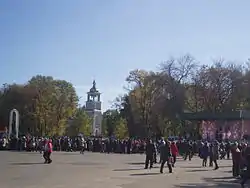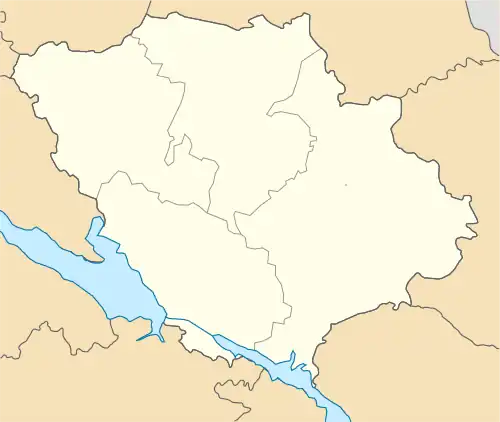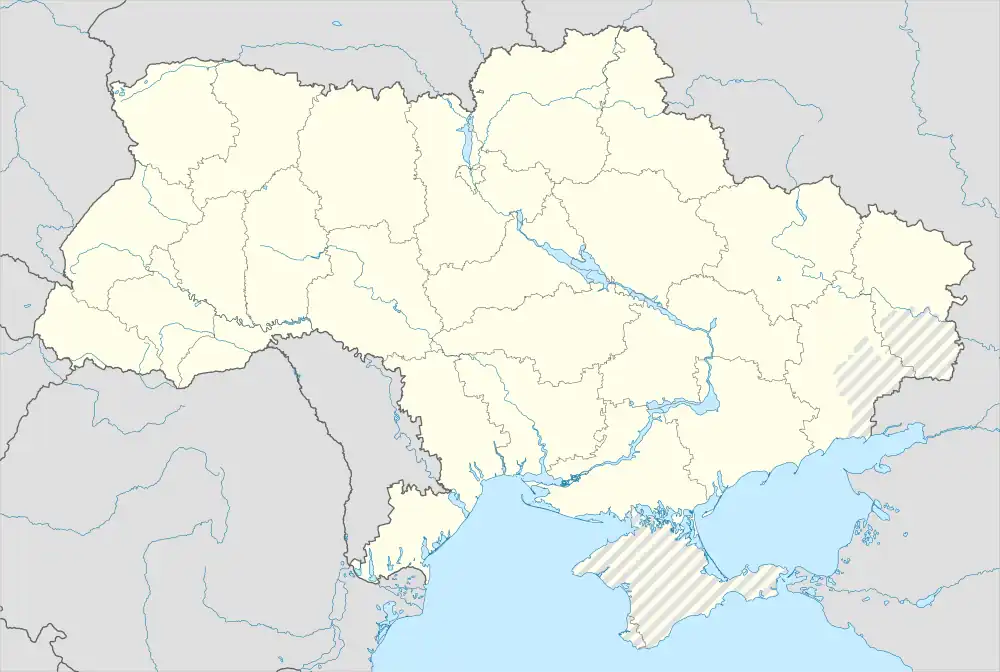Hadiach
Hadiach (Ukrainian: Га́дяч, romanized: Hadyach, pronounced [ˈɦɑdʲɐt͡ʃ]), sometimes spelled Hadyach, Gadyach, Gadiach, Haditch, or Hadziacz, is a city in Myrhorod Raion, Poltava Oblast (province) in the central-east part of Ukraine. It hosts the administration of Hadiach urban hromada, one of the hromadas of Ukraine.[1] Hadiach is located on the Psel River. Population: 22,851 (2022 estimate).[2]
Hadiach
Гадяч | |
|---|---|
 Cathedral Square in Hadiach | |
 Flag  Coat of arms | |
 Hadiach Location of Hadiach  Hadiach Hadiach (Ukraine) | |
| Coordinates: 50°22′00″N 34°0′0″E | |
| Country | |
| Oblast | |
| Raion | |
| Founded | 16431 |
| Government | |
| • Mayor | Volodymyr Nesterenko |
| Area | |
| • Total | 17.78 km2 (6.86 sq mi) |
| Elevation | 132 m (433 ft) |
| Population (2022) | |
| • Total | 22,851 |
| • Density | 1,400/km2 (4,000/sq mi) |
| Time zone | UTC+2 (EET) |
| • Summer (DST) | UTC+3 (EEST) |
| Postal code | 36000—36499 |
| Area code | +380 532 |
| Website | gadiach |
Name
In addition to the Ukrainian Гадяч (Hadiach), in other languages the name of the city is Russian: Гaдяч, romanized: Gadyach, Polish: Hadziacz and Yiddish: האדיטש.
Overview
Hadiach was granted city rights in 1634. It was a city of Kiev Voivodeship, Cossack Hetmanate, and Poltava Governorate.
At times of Cossack Hetmanate, Hadiach was a residence of Ukrainian Hetman Ivan Briukhovetsky, election of which saw division of the Hetmanate along the Dnieper river (see The Ruin (Ukrainian history)).
Hadiach is one of the main points of interest to Hasidic Jews visiting Ukraine due to the old cemetery that is on the river running through the city, where Shneur Zalman of Liadi is buried.
Until 18 July 2020, Hadiach was designated as a city of oblast significance and did not belong to Hadiach Raion even though it was the center of the raion. As part of the administrative reform of Ukraine, which reduced the number of raions of Poltava Oblast to four, the city was merged into Myrhorod Raion.[3][4]
During the 2022 Russian Invasion of Ukraine, there were skirmishes along this town and a Russian tank reportedly was spotted in the Psel River.
Population
Language
Distribution of the population by native language according to the 2001 census:[5]
| Language | Percentage |
|---|---|
| Ukrainian | 95.28% |
| Russian | 4.3% |
| other/undecided | 0.42% |
Geography
Climate
| Climate data for Hadiach (1981–2010) | |||||||||||||
|---|---|---|---|---|---|---|---|---|---|---|---|---|---|
| Month | Jan | Feb | Mar | Apr | May | Jun | Jul | Aug | Sep | Oct | Nov | Dec | Year |
| Average high °C (°F) | −2.1 (28.2) |
−1.2 (29.8) |
4.8 (40.6) |
14.3 (57.7) |
21.3 (70.3) |
24.4 (75.9) |
26.4 (79.5) |
25.8 (78.4) |
19.4 (66.9) |
12.2 (54.0) |
3.8 (38.8) |
−0.8 (30.6) |
12.4 (54.3) |
| Daily mean °C (°F) | −4.7 (23.5) |
−4.4 (24.1) |
0.8 (33.4) |
9.0 (48.2) |
15.2 (59.4) |
18.6 (65.5) |
20.4 (68.7) |
19.4 (66.9) |
13.7 (56.7) |
7.6 (45.7) |
0.9 (33.6) |
−3.5 (25.7) |
7.8 (46.0) |
| Average low °C (°F) | −7.2 (19.0) |
−7.4 (18.7) |
−2.5 (27.5) |
4.4 (39.9) |
9.6 (49.3) |
13.4 (56.1) |
15.1 (59.2) |
13.9 (57.0) |
9.0 (48.2) |
3.9 (39.0) |
−1.5 (29.3) |
−5.9 (21.4) |
3.7 (38.7) |
| Average precipitation mm (inches) | 42.4 (1.67) |
41.3 (1.63) |
42.3 (1.67) |
42.0 (1.65) |
48.6 (1.91) |
75.5 (2.97) |
70.9 (2.79) |
46.9 (1.85) |
55.2 (2.17) |
51.2 (2.02) |
46.6 (1.83) |
44.3 (1.74) |
607.2 (23.91) |
| Average precipitation days (≥ 1.0 mm) | 9.1 | 9.2 | 7.8 | 7.3 | 8.0 | 9.3 | 8.9 | 5.8 | 7.1 | 7.4 | 7.8 | 9.4 | 97.1 |
| Average relative humidity (%) | 85.2 | 82.2 | 77.3 | 66.7 | 63.3 | 68.9 | 70.4 | 69.0 | 74.9 | 80.0 | 86.3 | 86.6 | 75.9 |
| Source: World Meteorological Organization[6] | |||||||||||||
In literature
The main characters in Nikolai Gogol's story Ivan Fyodorovich Shponka and His Aunt are from Hadiach (Gadyach in the 1957 translation by David Magarshack).
Residents
- Mykhailo Drahomanov (1841-1895), political theorist, economist, historian, philosopher, and ethnographer
- Olena Pchilka, mother of Lesya Ukrainka and a sister of Drahomanov
Gallery
.JPG.webp) The city of Cossack Pride Hadiach welcomes you
The city of Cossack Pride Hadiach welcomes you.JPG.webp) River Psel under a bridge in Hadiach
River Psel under a bridge in Hadiach Entrance to the 'Ohel' of Shneur Zalman of Liadi where he is buried in Hadiach
Entrance to the 'Ohel' of Shneur Zalman of Liadi where he is buried in Hadiach.JPG.webp) Dormition Cathedral and belfry in Hadiach (Ukrainian Orthodox Church)
Dormition Cathedral and belfry in Hadiach (Ukrainian Orthodox Church) City concert hall
City concert hall
See also
References
- "Гадячская городская громада" (in Russian). Портал об'єднаних громад України.
- Чисельність наявного населення України на 1 січня 2022 [Number of Present Population of Ukraine, as of January 1, 2022] (PDF) (in Ukrainian and English). Kyiv: State Statistics Service of Ukraine. Archived (PDF) from the original on 4 July 2022.
- "Про утворення та ліквідацію районів. Постанова Верховної Ради України № 807-ІХ". Голос України (in Ukrainian). 18 July 2020. Retrieved 3 October 2020.
- "Нові райони: карти + склад" (in Ukrainian). Міністерство розвитку громад та територій України. 17 July 2020.
- https://socialdata.org.ua/projects/mova-2001/
- "World Meteorological Organization Climate Normals for 1981–2010". World Meteorological Organization. Archived from the original on 17 July 2021. Retrieved 17 July 2021.
External links
- Unofficial site of Gadyach
- Hadiach in the Encyclopedia of Ukraine
- "Gadyach" (news of Gadyach, events, weather, history. All in English, Ukrainian and Russian language)
- "Gadyach Zemstvo Stamps" - The gallery of local postage stamps of the Gadyach Zemstvo Post Office.